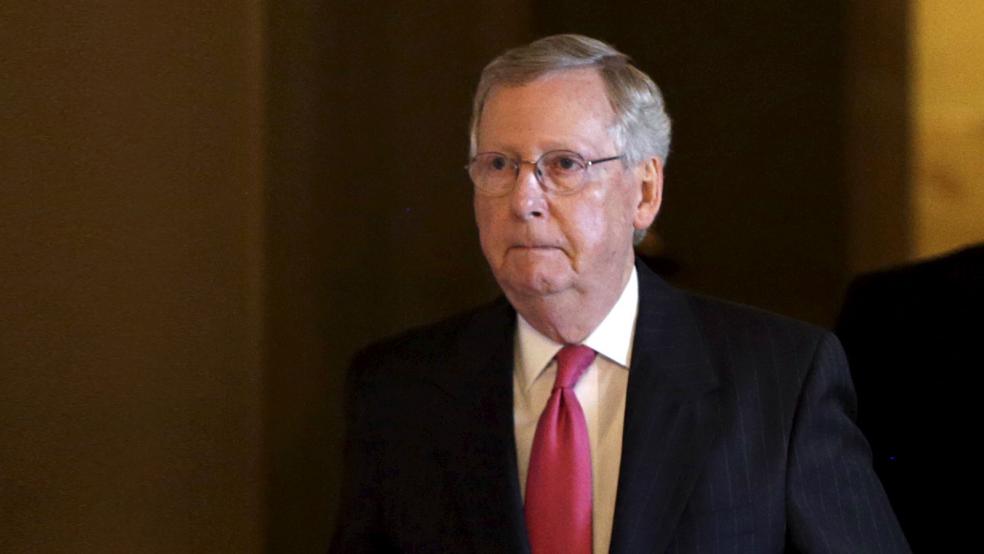Senate Majority Leader Mitch McConnell said Tuesday that the health care reform bill that his hand-picked panel of senators has been drafting in secrecy for weeks will finally be released to other lawmakers on Thursday. But it may be too late to rally support for the upper chamber’s version of the American Health Care Act, if reports coming out of a meeting of Republican senators are accurate.
Senator John Thune of South Dakota and Majority Whip John Cornyn exited a meeting of the Senate GOP caucus Tuesday afternoon and told reporters that there is currently no consensus among members on what the final version of the bill ought to look like.
Related: Uncertainty Over Obamacare Drives Up Average Premiums 18% Next Year
Because McConnell plans to push the bill through the chamber as part of a reconciliation measure that is immune to a Democratic filibuster, he can pass it with as few as 50 votes, with Vice President Mike Pence intervening to break a 50-50 tie. But McConnell has only a 52-48 majority, meaning that if he loses more than two of his own members, he’s got a major problem. But at least seven GOP senators -- including Maine’s Susan Collins, Alaska’s Lisa Murkowski, Nevada’s Dean Heller, Ohio’s Rob Portman, Nebraska’s Ben Sasse, West Virginia’s Shelley Moore Capito and Louisiana’s Bill Cassidy -- have all expressed concern about the bill.
Some are objecting on process grounds, because they are unhappy that they have been kept in the dark about the bill’s contents. Others are worried about reports that the bill will, in parts, mirror the House version of the legislation. That bill is extremely unpopular with the public, and CBO has estimated that it will result in 23 million Americans losing health insurance coverage.
At the same time, McConnell is facing questions about whether the bill he presents to his members Thursday will be the same bill that goes to the floor. According to reporting from Axios on Tuesday, the Senate parliamentarian has expressed concern that some proposals that the GOP would like to import from the House version of the bill could violate the Senate’s arcane rules for budget reconciliation bills. Specifically, the parliamentarian is concerned about measures that would change fundamental rules put in place under the Affordable Care Act, which mandate what care and services medical insurers must cover in federally subsidized plans.
Related: 5 Major Hazards on the Republicans’ Path to Health Care Reform
It all adds up to one of the thorniest legislative challenges McConnell has come up against since taking over as majority leader in 2015. But as we move towards what may be the Republican’s end game on health care reform, there are three things to keep in mind:
1. Mitch McConnell is the shrewdest politician on Capitol Hill and it would be a serious mistake to underestimate his ability to pull victory from the jaws of defeat.
2. If the bill does go down to defeat, it’s most likely that McConnell had concluded that he couldn’t muster the 50 Republican votes needed to win passage under budget reconciliation rules but wanted to clear the decks of this issue by giving it an up or down vote. McConnell would be much happier moving on to proposals more to his liking, such as tax reform and infrastructure.
3. If the Senate bill goes down to defeat and there is no way to resurrect the issue for the Republicans, then it is incumbent on Trump and the Republican leadership in the House and Senate to find a way to salvage or prop up Obamacare.
Related: Big Pharma’s Big Lobby Money Is Preventing Real Reform on Drug Prices
The Republicans have been right in criticizing Obamacare for some of its more obvious flaws, including much higher premiums and out-of-pocket costs than originally promised, fewer policy choices as more insurers pull out of the system, a failed experiment with non-profit insurance co-ops and onerous business mandates and tax levies.
But the uninsured rate for Americans has tumbled dramatically over the past few years in the wake of Obamacare and expanded Medicaid coverage. Only 11 percent of adults and children are still without health care coverage, according to a survey last year by Gallup and Healthways. For the first time, millions of low and moderate income individuals and families are receiving coverage.
However, Trump, Ryan and Health and Human Services Secretary Tom Price have been doing everything in their power to weaken the program, as if to fulfill their prediction that Obamacare is in a financial “death spiral.” But unless they want to be in a situation a year and a half from now when millions of Americans have lost their health care coverage on the eve of the 2018 mid-term election, they will have to take a number of steps to preserve Obamacare – as unpleasant a task as that may seem to them now.
Related: How Unscrupulous Hospice Operators Are Stealing Millions From Medicare
Among the more obvious things they will have to do is guarantee the continuation of the $7 billion a year in cost sharing subsidies to the insurance industry to help defray their expenses in providing less expensive coverage to low and moderate income people. That would go a long way toward reassuring insurers and preventing more from bailing out of the system.






